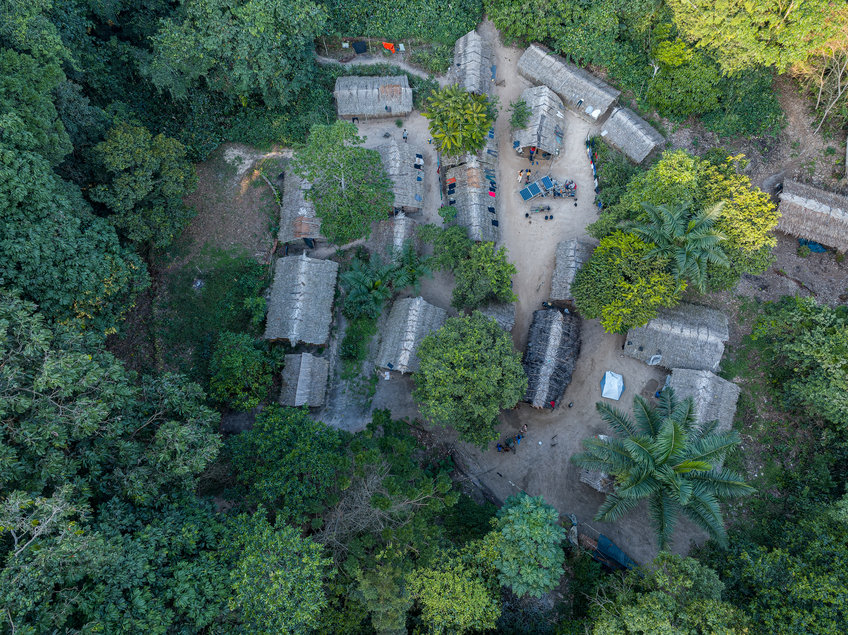
Field Team of the LuiKotale Bonobo Project
Gilly Denman
I am absolutely fascinated by great apes and their culture, and I have dreamt of working with our closest relatives in the wild since my childhood. I grew up in Pasadena, California, and gained my first experience working closely with animals at the Los Angeles Zoo, where I volunteered throughout high school and during my gap year. I moved to Massachusetts for college, and graduated with a biology degree from Williams College in June of 2025. For my senior thesis, I conducted research on two hybridizing species of field crickets. I investigated the history of their speciation and analyzed gene flow between the two species. In July, I joined the field team in LuiKotale to contribute to the collection of long-term data. Later on, I plan to pursue graduate studies in evolutionary biology, and I hope to continue working with primates in the field long into the future!
Tanguy Deville
I am a naturalist and photographer focusing on research projects on birds and mammals. I have worked in a variety of habitats including sub-Antarctic and Arctic islands, savannahs, and tropical, boreal and temperate forests. I specialize in tree climbing, which allows me to get into the canopies of tropical forests and explore their diverse fauna. Combining this skill with photography gives me an unusual perspective on arboreal species and provides me with new information about their behavior and ecology.
Michaela Foley
I am an ecologist with a background in animal husbandry, and field experience in remote sub-tropical and equatorial tropical forests. I studied Zoology and Environmental Science at North Carolina State University, after which I worked at several AZA accredited zoos in the US, and in Belize on a carnivore population monitoring and human-wildlife conflict project. I spent last year working as an LTS research assistant for the LuiKotale Bonobo Project. Since July I am back in LuiKotale, working on a project that investigates the physiological constitution and social status of older female bonobos.
Amy Hutchison
I studied Zoology and Marine Science at the University of Western Australia. After graduating I worked for an environmental consultancy, conducting field surveys throughout the Western Australian outback with a focus on the Pilbara region. After a brief stint as an environmental advisor for a gold mine, I moved to Malawi for five months for bat conservation and research, where I contributed to a project investigating bats and diseases, and trained volunteers in bat survey techniques. I joined the LuiKotale field team in February 2025 to combine my interest in behavioural ecology with my love of working in nature.
Sofia Lunde Kjærland
I am a primatologist with a deep passion for conservation and animal behavior. My academic journey began with a Bachelor’s degree in social anthropology, during which I studied in Costa Rica and fell in love with the local wildlife, inspired by those dedicated to protecting the forest and its inhabitants. This passion eventually led me to pursue a Master’s degree in Primate Conservation at Oxford Brookes University. During my MSc, I studied chimpanzees in Zambia, concentrating on the well-being of semi-wild individuals and their social dynamics during the introduction of new members into an existing group. My research emphasized primate social interactions and the observation of abnormal behavior. My interests lie particularly in great apes, human-wildlife conflict, and the illegal bushmeat and pet trade. I joined the LuiKotale Bonobo Project as a research assistant in December 2024, contributing to the long-term study of bonobos in their natural habitat—an aspiration I've held for many years.
Niko Mantras
I’m a conservation biologist passionate about protecting wildlife and fostering human-wildlife coexistence. My work has taken me across the globe, from bat conservation in Malawi to studying electric vehicle infrastructure in Bhutan. I love traveling, hiking, and exploring new places, especially when it involves working with animals. I have a particular fascination with apes and enjoy contributing to conservation efforts that make a difference.
Garance Moutier
I studied sociology in Germany (Ludwig Maximilians Universität, Munich) and France (École Normale Supérieure, Paris). During my studies, I had the opportunity to observe the behavior of herring gulls. This project reinforced my interest in studying animals, which remains a marginal subject in sociology. I now want to focus on studying the shared worlds of humans and animals. In this context, non-human primates living in their natural habitat particularly caught my attention. Given the close evolutionary ties between bonobos and humans, as well as the increasing threats to biodiversity, contributing to the LuiKotale and Ekongo projects as a research assistant is a meaningful way to advance research and support conservation efforts for this endangered species.
